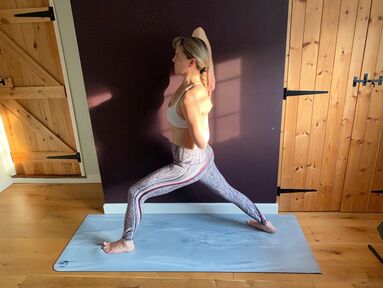|
Inspired by one of Merete Holm-Brantbjerg’s online presentations, I have been thinking about sustainability of change in a yogic and therapeutic environment. Change in that context has two components: 1) The opening up of something new and the gaining of access to new resources and skills. 2) The holding on to the new resources and skills that have been opened up.
The second aspect of change is about sustainability and it’s often the harder part. In my own process I have experienced transformation and gained new resources that I have subsequently lost again. Often the response to the loss is a “working harder”. However, this approach leads to areas in our bodies that are already in hiding to go away further, which in turn will lead to less of us being present. When we’re less present the skills of containment and orientation are lessened, too. For me, the key to sustainable change is therefore to work with the areas in our bodies that have the tendency to give up, i.e. hypo-responsive areas, to teach them gently and slowly to hold more energy and thereby to increase our capacity for containment and safety. Contrary, working harder and forcing will actually move us further away from ourselves, as the ability to be present is reduced. What has supported you in holding on to change?
0 Comments
I have often written about my own personal process with regards to “not taking things personally”. Recently, when I had a session with my mentor and supervisor, there was another layer that emerged from that. Even though I understood the collapse of the internal boundary beforehand, which is essentially what “taking things personally” is, I experienced deeper layers underneath that; feelings that I distanced myself from. I had been frequently working with my mentor on staying in my body without interpreting sensations or coming to conclusions too quickly. I often felt criticised when she guided me back to my body, as I really wanted her to listen to what I had to say or what insights I had in that moment. I perceived her guiding me back as a judgement, even though objectively I understood that she was coming from a very neutral, allowing and kind place.
I interpreted her intentions and directions as “I’m not enough”, “I’m not doing this right” and “I should be somehow different”. In those moments, my heart was pounding and I felt very exposed and vulnerable. I could feel the increased blood flow to my face, a sign of feeling ashamed. My last session with her was a real breakthrough for me, as I could stay with the physical sensations and discovered the huge amount of fear in my system, which I often override or don’t acknowledge. My go to place has been anger, fight or action. In that moment, I could sit with my helplessness, which touched into very young places inside of myself. Even though it was uncomfortable, it was manageable and the energy eventually got processed and moved. I feel the moment I moved beyond the “taking things personally”, I could really be with the emotion of fear, ultimately evoking a deep shift inside of myself. What are the emotions you tend to distance yourself from? One of my teachers in the body psychotherapy world often talks about group dynamics and how we relate to people. She describes two relational systems: dominance/submission and the supportive companionable. The first way of relating is comparing ourselves to others in the group and start to feel inferior or superior. In other words, we go “one down” or “one up”. The other way of relating is to move into the “supportive companionable” where we can relate as equals – no matter what functional role we are occupying. When we are in the “less than” space we often experience powerlessness. In body psychotherapy terms: we lose our inner authority. In that moment, we sense that we don’t have a choice. We feel that things are happening “to” us and that we don’t have an impact on our environment. To work with trauma and stress it’s crucial that we get out of the patterns of dominance (thinking too much of ourselves) and submission (thinking too little of ourselves) and move towards the supportive companionable.
The current situation is stress inducing, can be potentially traumatic and I have been tracking in myself that occasionally I’m moving into the one down position. In those moments I feel things are done to me and the world is unfair. When I’m stopping and recognising that I have choices, albeit sometimes not great ones, I can reclaim my inner power and take charge of making things work for me, which is a crucial aspect in moving through the current difficulties in a healthy way. To maintain inner authority, it’s pivotal that we take small breaks, sense into how we are, slow down and integrate our experiences. We need to take charge of making things work for us. The inner feeling of being in charge gets diminished when we just “suck it up and get on with things". When do you lose your sense of inner authority? What is it like in your body? Where do you collapse? What choices do you actually have? |
BlogYoga, well-being and mindfulness... always walk in beauty. Categories
All
Archives
September 2022
|




 RSS Feed
RSS Feed